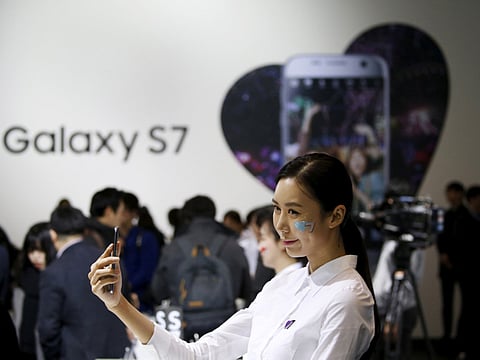Samsung rewrites the playbook to halt smartphone slide
Tough decisions like the S7 camera deliver near 2-year high in mobile profit

From the way it chooses smartphone components to the models it brings to market, Samsung Electronics has undergone a painful process of breaking from its past to reverse a slide in its handset business.
For example, the world’s largest smartphone maker agonised over camera specs for its flagship Galaxy S7 until the last moment — ultimately defying industry convention by opting for fewer pixels in exchange for improved autofocus features and low-light performance, a move that contributed to early success.
It also pared back its product line-up, overcoming internal resistance, enabling it to streamline production, an executive said.
The handset business has now stabilised, and had its best profit in nearly two years in January-March, though historically low smartphone industry growth still leaves Samsung looking for the “next big thing”.
“We’ve now gotten to a point where we can secure a baseline profit even if the market stagnates, so long as we don’t make a bad mistake,” said Kim Gae-youn, vice-president in charge of Samsung’s smartphone product planning. “I’m confident we can hold our ground.”
After peaking in 2013, a sharp drop in mobile profits exposed Samsung as slow to adjust to the changing market: its budget devices were overpriced and unappealing versus Chinese offerings, and the 2014 version of its Galaxy S flopped.
That prompted a cull among executives and stoked investor worries Samsung might not be able to recover as rivals including Apple and China’s Huawei Technologies and Xiaomi gained market share at its expense.
There was no sweeping, across-the-board fix. Rather, Samsung embarked two years ago on an overhaul that included a shift from a phone-for-all-needs approach towards a line-up that emphasised economies of scale.
It revamped design, using metal frames and curved screens, and gave high-end features such as organic light-emitting diode (OLED) screens to its low- and mid-tier products.
Camera conundrum
As Samsung prepared to launch its Galaxy S7 phones this year, executives went back and forth over whether to use a 12-megapixel rear camera that shoots better in the dark and has improved auto focus, or stay with a 16-megapixel count. At the last moment, they opted for 12-megapixels — a rare step down in an industry fixated on higher numbers.
This meant a change in approach for a company known to tout the highest specs for its flagship products, and executives required convincing, Kim said. They were swayed by data showing consumers want more than just a high pixel count.
“In the past, based on our past decision-making process, we never would have gone back,” Kim said in an interview at Samsung’s headquarters campus in Suwon, south of Seoul.
The move worked. More than half of US S7 buyers surveyed cited camera quality as a key selling point, compared with a third of all smartphone buyers in the first quarter, according to Kantar US Insights.
The same mindset shift gave Samsung confidence to release a Galaxy 7 series that looks similar to its predecessor. This incremental upgrade drew initial scepticism, but the S7 phones have beaten expectations and could set a new first-year sales record for the South Korean firm.
Samsung must still convince investors its recent improvement is sustainable, and that innovative products are in the works to grow revenue. Some attribute its rebound partly to Apple’s weaker performance, and cost-cutting.
“I think they will try to imbue the Note [phone] with a more transformative change such as new technology under the new leadership, than the fine-tuning we saw with the Galaxy S7,” said Kim Hyun-su, a fund manager with IBK Investment & Securities, which holds Samsung shares.
Long-time mobile chief J.K. Shin ceded day-to-day management in December when Dongjin Koh became president of the handset unit in the biggest leadership change to date under the conglomerate’s heir-apparent Jay Y. Lee.
Samsung’s operating profit is expected to be flat this year and grow just 3 percent next year, according to 43 analysts polled by Thomson Reuters I/B/E/S.
Less is more
Slimming down its product portfolio was another departure from the past, when Samsung launched variations to soak up as much demand as possible. As market growth stalled, that approach was no longer cost effective.
It phased out unpopular models and created common platforms, with more phones using the same parts. Researcher Counterpoint says Samsung has shed close to a third of its product portfolio.
That move also had to overcome internal resistance.
“If you’re in the trenches, you want to have a machine gun, a grenade, a mine on hand,” Kim said. “There are also different needs depending on individual markets, so regional sales staff naturally can’t be happy when the company moves to rationalize and restructure from a global structure. The transition process is painful.”
The product cull paid off; the revamped models helped Samsung recover in big markets such as India. “There was a feeling the sheer number of phones in the market was confusing for customers,” said a Samsung India executive, declining to be identified as he was not authorised to speak with the media.
Despite a solid first quarter, analysts remain cautious about Samsung’s outlook, with researcher Gartner predicting global smartphone sales growth will slow to 7 per cent this year.
Samsung has also yet to recover in China, the world’s top smartphone market, where it ranks sixth with 7 per cent market share, according to Strategy Analytics, well behind local rivals such as Huawei, Xiaomi and OPPO.
Samsung’s Kim says his focus now is on premium-end smartphones — those costing $600 (about Dh2,200) and above — where not all industry players have the muscle to compete.
“There’s still room for growth in the market,” he said.
“This segment wants innovation, which has turned it into an area that requires huge capital equipment investments.”



